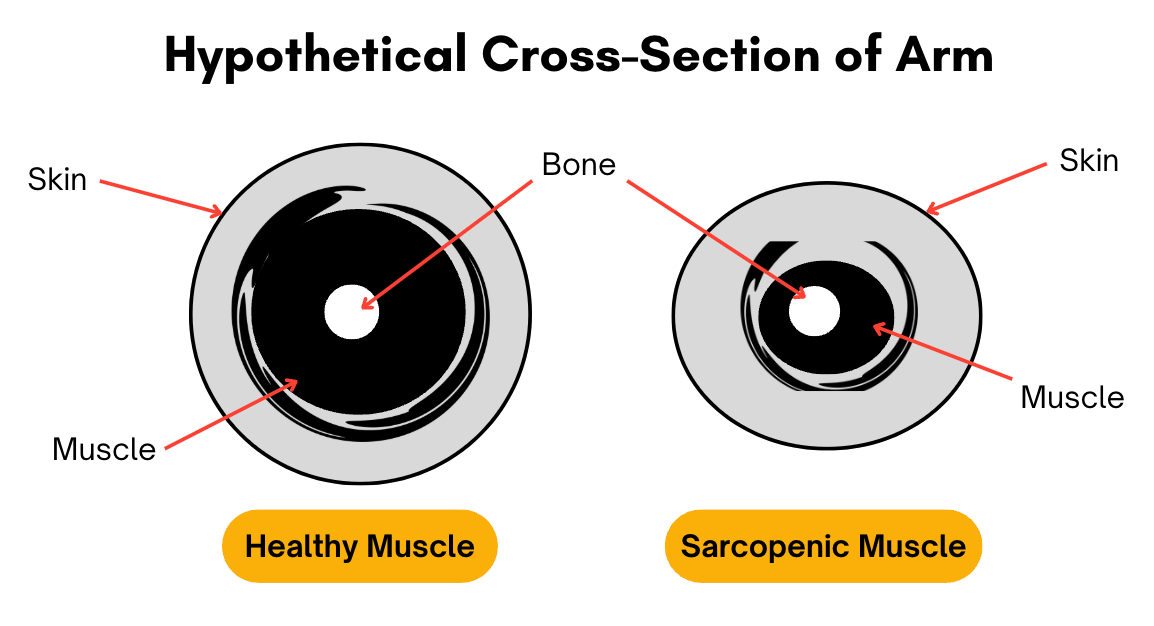Welcome to Fed—I’m thrilled you’re here! This is your go-to resource for nutrition questions and controversies. Think of me as your tutor—here to break down the noise, offer context, and help make sense of it all.
Weight loss. It’s a topic that never goes out of style.
Do I need to lose weight? Should I? Shouldn’t I? Am I actually healthy at this weight?
That last question is the real question—the only one that matters. And the answer doesn’t come from a scale, a mirror, or a side-by-side transformation photo. It comes from a deeper look at your health: your medical history, biometrics (lab values, blood pressure, metabolic markers), and how your body functions (joint pain, mobility, agility, energy levels).
But in a world where Ozempic headlines dominate the news and celebrities are shrinking overnight, the conversation is often reduced to one thing: size. And that has me wondering…
A lot of people are getting smaller. But are they getting healthier?
The Hidden Risk of Weight Loss: Losing More Than Fat
Let’s talk about sarcopenia—a word that doesn’t get nearly enough attention in weight loss conversations.
Sarcopenia is the gradual loss of muscle mass, strength, and function. It’s not just about aesthetics; it’s a real threat to mobility, metabolism, and long-term health. It contributes to frailty, increases the risk of falls, and sets the stage for chronic disease—even death.
While age-related hormonal shifts and inactivity play a role, rapid or poorly managed weight loss can accelerate muscle loss. When you’re in a calorie deficit, your body pulls energy from somewhere—and without the right nutrition and exercise, it won’t just burn fat; it’ll break down muscle, too.
How to Lose Weight Without Losing Muscle
The best insights we have come from the Biggest Loser study. Yes, that Biggest Loser—the reality show where contestants spent weeks on a ranch following a tightly controlled diet and intense exercise regimen. While the show itself was controversial, the research it produced was incredibly valuable because participants were monitored so closely. (Check out my post on nutrition research to understand how difficult it is to gather quality data from a nutrition study.)
Breaking Down "The Biggest Loser" Study: What Really Drives Weight Loss?
Think of weight loss like paying off debt. Imagine you owe a huge balance on a credit card (body fat) and want to get rid of it fast. You have two main strategies: cutting spending (dieting) or working extra hours (exercising). The Biggest Loser makes it seem like working overtime—grueling workouts—is the key to paying down the balance. But researchers wanted to know: How much of the contestants’ success actually came from spending less (eating fewer calories) versus working more (exercising)?
To find out, they built a computer model of human metabolism, like a financial calculator for weight loss. They plugged in real contestant data—weight loss, calorie intake, body fat changes, and exercise habits—to “reverse-engineer” the process. Then, they ran what-if scenarios:
What if contestants had only cut spending (dieted)?
What if they had only worked extra hours (exercised)?
The results showed that while both play a role, cutting spending (diet) had the biggest impact—but working extra (exercise) helped protect against losing valuable assets (muscle mass).
The Biggest Loser study is often cited as an example of extreme weight loss gone wrong. But as a nutrition professional, I see it as a cautionary tale: it’s not just about how much weight you lose, but how you lose it. The contestants lost an enormous amount of weight, but many also saw their metabolic rates plummet. That’s why focusing on sustainable strategies—ones that prioritize muscle retention and metabolic health over rapid fat loss—is critical.
5-Point Plan for Responsible Weight Loss
If you’re on a weight loss journey, make sure you’re getting healthier, not just smaller. Here’s how:
Strength Train
As a life long runner and cardio junkie, this has been a recent and not so smooth (actually, really uncomfortable) transition for me. I love my runs and still do about a couple a week, but I swear the weight training (I do it myself - no trainer) makes a difference. (Note: I’m not looking to lose weight, just preserve my muscle mass, which decreases as we age.)
Aim for at least 2-3 days per week of resistance training.
Focus on progressive loads (gradually increasing weights/reps).
Prioritize Protein
General guideline if you aim to decrease weight: 0.5–0.75 grams of protein per pound of body weight per day (depending on activity level).
Evenly distribute your protein throughout the day for a balanced approach. Breakfast tends to be the meal most devoid of protein, so look for ways of getting some in (quick options: Greek yogurt, smoothies, eggs, nut butters, tofu scrambles)
Protein supports muscle maintenance and helps with satiety (keeps you feeling full!)
Good sources of protein:
Animal-based: Chicken, turkey, fish, eggs, Greek yogurt, cottage cheese
Plant-based: Lentils, quinoa, tofu, tempeh, edamame
Avoid Extreme Caloric Deficits
No more than a 500–750 calorie deficit per day is generally ideal for fat loss while preserving muscle.
Work with a Registered Dietitian to calculate your calorie needs and identify realistic swaps and reductions in your diet. Or do it yourself by finding ways to make swaps to reduce your caloric intake.
Avoid crash diets—they set you up for metabolic slowdown and muscle loss.
Get the Right Nutrients
These are two that often get overlooked.
Vitamin D & Calcium: Support Bone Health
Good sources: Fatty fish (salmon, sardines), fortified dairy, egg yolks, leafy greens, almonds, tofu
Omega-3s: Reduce Inflammation, Which Helps with Muscle Preservation
Good sources: Salmon, mackerel, walnuts, flaxseeds, chia seeds
Move More
Strength training is key, but non-exercise activity thermogenesis (NEAT)—things like walking, standing, and fidgeting—also helps maintain metabolism.
Aim for 8,000–10,000 steps daily and incorporate movement throughout your day.
Final Thought: Aim for Health Over Size
In my years working with patients and clients, I’ve seen a common pattern: those who focus solely on the scale often end up frustrated, while those who prioritize muscle and metabolic health find long-term success.
Weight loss without strength is like deflating a balloon—it might shrink, but it won’t hold its shape. Instead, I encourage a focus on what a body can do rather than just what it weighs.
If you want a deeper dive into metabolism and how to fuel your body properly, check out my Metabolism Cheat Sheet under Spoonfed.
As always, thank you for taking the time to read this post. I’m truly so glad you’re here. If you like what you’re reading, please consider sharing this newsletter. (And if you have the time to like it, that would mean a lot to me!)














So many athletes i work with think they can achieve their goals with just more exercise! I love the way you describe the results of this study. Its a very digestible analogy!